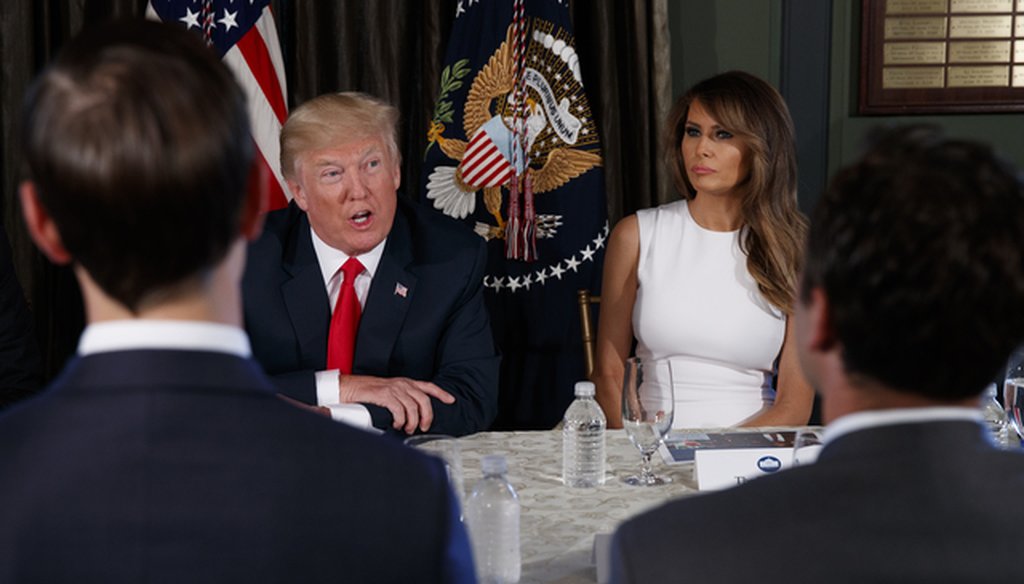Stand up for the facts!
Our only agenda is to publish the truth so you can be an informed participant in democracy.
We need your help.
I would like to contribute
Trump has mixed record on expanding mental health services

President Donald Trump, pictured with Melania Trump, speaks during a briefing on the opioid crisis Aug. 8, 2017, at Trump National Golf Club in Bedminster, N.J. (AP Photo)
President Donald Trump's health care plan promised to help national mental health efforts.
His campaign's list of health care goals (archived here) said: "Finally, we need to reform our mental health programs and institutions in this country. Families, without the ability to get the information needed to help those who are ailing, are too often not given the tools to help their loved ones."
Much of the reform that has taken place during his first year in office can be attributed to the former Congress.
The 21st Century Cures Act, passed a month before Trump took office. The bill drew criticism for removing some regulations on the pharmaceutical industry (proponents argued it would help speed up drug development). But the legislation also appropriated funding for mental health research, treatment and early intervention as well as established a new assistant secretary for mental health and substance use disorders.
Trump's nominee for the new position, Elinore McCance-Katz, was approved by the Senate on Aug. 3. She leads the U.S. Department of Health and Human Services' Substance Abuse and Mental Health Services Administration and is tasked with streamlining more than 100 federal agencies concerned with mental health.
In the past year, the Trump administration has also:
-
Announced an Oct. 26 executive action that, in light of the ongoing opioid crisis, would allow the quick hiring of personnel to deal with the epidemic, the expansion of telemedicine services and more flexibility in using grant money to help address the public health issue.
-
Expanded veterans' access to urgent mental health care services to former service members with other-than-honorable discharges.
However, not every action has been helpful to the cause.
Trump has proposed and supported plans that cut Medicaid funding, including Republican-led plans to repeal and replace Obamacare. Medicaid is the largest payer for mental health services in the United States.
Andrew Sperling, the director of legislative affairs for the National Alliance on Mental Illness, said the failure of Obamacare repeal-and-replace has been a good thing for mental health care, but he also said the administration should be applauded for appointing McCance-Katz, who he believes to be a great choice for the position.
Going forward, Sperling said, the Trump administration could do more to increase information sharing and physician and family access to patients' medical records, within the bounds protected by privacy laws.
Trump has made some effort to make good on this promise, though he has also tried to get legislation passed that would cut down on mental health care services. Until we see more action, we rate it In the Works.
Our Sources
USA Today, "Mental health advocates celebrate passage of 21st Century Cures Act," Dec. 7, 2016
Congress.gov, Nomination of Elinore McCance-Katz, accessed Nov. 20, 2017
The White House, Executive action on opioid crisis, Oct. 26, 2017
U.S. Department of Veterans Affairs, news release, June 27, 2017
PolitiFact, "Make no cuts to Medicaid" promise tracker, accessed Nov. 20, 2017
Medicaid.gov, Behavioral health services information page, accessed Nov. 20, 2017
Phone interview with Andrew Sperling, director of legislative affairs for the National Alliance on Mental Illness, Nov. 20, 2017